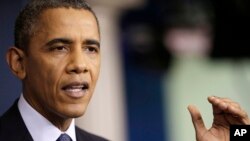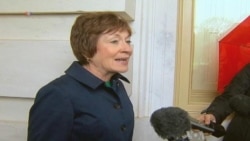Regarding this week's meetings with congressional members about the political stalemate on government funding and borrowing, U.S. President Barack Obama said there was one agreement: "the need to avoid the economic consequences of not meeting [the] country's commitments."
The president said in his weekly address Saturday damage to the country's "sterling credit rating" would make it more expensive for everyone in America to borrow money, creating what would amount to what he called a "Republican default tax on every family and business in America." He said a default would also have a detrimental effect on global markets.
However, White House officials said Friday there is still no agreement with Republicans on how to end the stalemate. Both sides have agreed to keep talking.
House Armed Services chairman Buck McKeon, who delivered the Republican address, said the two sides had found "common ground" this week with legislation supporting the military and their families during the shutdown, and now should continue to work out more agreements.
Watch related video story by VOA's Carla Babb
Meanwhile, three of the most famous U.S. national parks - the Statue of Liberty, the Grand Canyon and Mount Rushmore - have announced they will reopen in the coming days after state governors reached deals with the federal government, despite the ongoing government shutdown. The states have agreed to provide the money needed to operate the parks.
Back in Washington, both sides have refused to divulge specific details of what is being discussed as they look for a way to end the partial government shutdown that began October 1 and increase the country's $16.7 trillion borrowing limit. The United States has said it will have only limited funds left to pay its bills when it reaches the borrowing cap Thursday.
Finance chiefs of the world's leading economies urged the United States Friday to quickly resolve the stalemate. The G20 finance ministers meeting in Washington said the U.S., with the world's largest economy, "needs to take urgent action to address short-term fiscal uncertainties."
Republicans in the House of Representatives have offered to increase the debt ceiling through November 22, while looking to negotiate more spending cuts with the White House over the next six weeks.
The president said in his weekly address Saturday damage to the country's "sterling credit rating" would make it more expensive for everyone in America to borrow money, creating what would amount to what he called a "Republican default tax on every family and business in America." He said a default would also have a detrimental effect on global markets.
However, White House officials said Friday there is still no agreement with Republicans on how to end the stalemate. Both sides have agreed to keep talking.
House Armed Services chairman Buck McKeon, who delivered the Republican address, said the two sides had found "common ground" this week with legislation supporting the military and their families during the shutdown, and now should continue to work out more agreements.
Watch related video story by VOA's Carla Babb
Meanwhile, three of the most famous U.S. national parks - the Statue of Liberty, the Grand Canyon and Mount Rushmore - have announced they will reopen in the coming days after state governors reached deals with the federal government, despite the ongoing government shutdown. The states have agreed to provide the money needed to operate the parks.
Back in Washington, both sides have refused to divulge specific details of what is being discussed as they look for a way to end the partial government shutdown that began October 1 and increase the country's $16.7 trillion borrowing limit. The United States has said it will have only limited funds left to pay its bills when it reaches the borrowing cap Thursday.
Finance chiefs of the world's leading economies urged the United States Friday to quickly resolve the stalemate. The G20 finance ministers meeting in Washington said the U.S., with the world's largest economy, "needs to take urgent action to address short-term fiscal uncertainties."
Republicans in the House of Representatives have offered to increase the debt ceiling through November 22, while looking to negotiate more spending cuts with the White House over the next six weeks.







